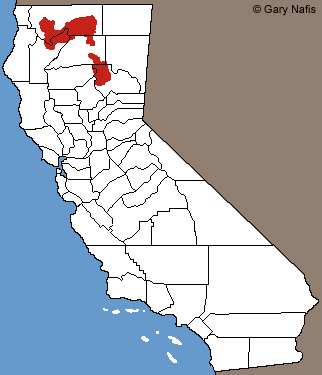About a month ago I helped my friend, who's an undergrad at Humboldt State Univeristy, northern California, to collect some Cascade's frogs (Rana cascadae) for his senior thesis. It's an interesting project involving with clearing chytrid infection with itraconazole (anti-fungal drug) in metamorphs of Cascade's frogs. The study site was at the Lassen Volcanic National Park in northeastern California, one of the few areas that these high elevation native frogs occur.
Here's a map showing the state of California and the red zone is roughly where you can find R. cascadae. This frog also occurs in Oregon, although listed as an endangered species there, and can be found in the Olympic mountains of Washington.
Tadpoles in a shallow pond with a data logger. The tadpoles look like a typical Rana frog on the west coast.
This appears to be a young of last year, still relatively a small frog.
A juvenile frog.
A metamorph that had recently absorbed its tail. In this particular area, chytrid is devastating to these froglets. Not only most of these babies are infected by chytrid, but almost all of them won't make it due to chytridiomycosis. And this is where this project comes into play. Hopefully we can treat these frogs free of the disease and release them back here. Hopefully they'll have a better chance of surviving.
Another juvenile. They blend in pretty well in their environment, don't they?
A rough place to be. This is the only meadow around that provides moisture. All the surrounding areas are very dry and extensive.
Notice the spotted throat, quite characteristic of the Cascade's frogs.
A staged shot
Here's a northern red-legged frog (Rana aurora), Cascade's frog's lower elevation counterpart that lives on the coast of the entire Pacific Northwest. A genetic study revealed that these two frogs form sister taxa. In other words, to each other they are the most closely related species.
This is the same individual that appears as my avatar and lives in my house, an adult male, just like me... lol!
Notice how the throat is not spotted like R. cascadae









 Reply With Quote
Reply With Quote

![Canada [Canada]](images/flags/Canada.gif)




